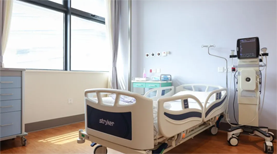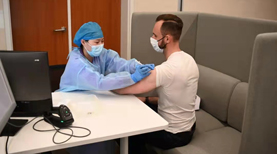To Cure Sometimes, To Relieve Often, To Comfort Always.
When a patient reaches a point where they must make difficult decisions about how they will deal with an advanced disease, the Palliative Care team at Jiahui Health can be there to help. Here is a guide to some of the important questions they can help to address.
Treatment options for advanced disease, what needs to be weighed and understood?
When the condition is life-threatening, the choices that need to be made are difficult, because the patient must consider that:
•Some treatments are more likely to prolong life, but the risk of side effects is higher;
•Some treatments may have lower risks, but are unlikely to prolong life;
•Side effects are sometimes different, such as length of stay in hospital, degree of fatigue or discomfort, etc.
Medical staff will help weigh the pros and cons of each treatment method, but it is also necessary for the patient or a family member to participate in treatment decision-making, and for them to choose the appropriate treatment together. Regarding the selected treatment plan, all parties should understand the following issues:
•What are the benefits of this treatment? Could it help prolong life? Can it reduce or prevent symptoms?
•What are the disadvantages of this treatment?
•Are there other options that I should be aware of?
•What will happen if I do not receive the treatment?
The purpose of invasive treatment is to ensure the survival of the patient as much as possible. It may include tracheal intubation, nasogastric tube, hemodialysis, etc., as well as various operations, such as inserting various tubes into arteries and veins, and drawing blood for various examinations. Some patients with an advanced disease who choose invasive treatment will eventually be admitted to the intensive care unit (ICU), which means:
•Staying in an open space so that you can be observed by medical staff;
•Lots of noises and activities around you, often at all hours of the day and night;
•Staying in bed, and may even be secured to the bed to ensure your safety;
•You will likely require catheters and other equipment;
•Have your blood drawn and different IVs and other needles inserted multiple times a day.
For patients with advanced disease, these treatments may cause discomfort, do little help to the underlying disease, and cannot make a meaningful difference in extending their life. So before your condition becomes very serious, you must consider how much invasive treatment you want to receive. This issue needs to be carefully considered when it comes to choosing treatment for advanced diseases.
What should I do if I don’t want invasive treatment?
If you don't want invasive treatment, it doesn't mean you have to simply tolerate the discomfort caused by your disease. You can also choose treatment to control and soothe your symptoms, such as:
•Pain
•Nausea or vomiting
•Anxiety or nervousness
•Depression
•Constipation
•Difficulty breathing
•Anorexia
•Fatigue
•Difficulty sleeping
Palliative medicine is an interdisciplinary medical profession that focuses on providing the best possible quality of life (QOL) support for patients and families facing serious illnesses, as well as preventing and alleviating suffering. For all life-threatening serious diseases, at any time in the course of the disease, the patient can be provided with appropriate treatment to relieve symptoms. Palliative care can even be carried out at the same time as rehabilitative and life-prolonging treatments.
Palliative therapy is not a choice to prolong life after the patient has given up treatment, nor is it a choice when there are no other treatment options, nor does it mean that he patient and their family have given up. Palliative care is simply there to provide better support for patients and their families.
Informing your family or friends of your wishes or requirements will help you to pass away peacefully and with dignity. For example, tell them where you want to die and whether you want to donate organs after you die.
Make your wishes clear
If you want to express your wishes, there are legal documents called "advance directives” that can help. There are many types of advance directives, the three most useful are:
01-Medical care power of attorney
You can choose an agent through the medical care power of attorney to make medical decisions for you when you are unable to express them yourself. The benefit is that it allows doctors and family members to know who you want to choose for you. After choosing a health care agent, you must inform them of your wishes so that he/she knows how to make decisions for you.
02-Living will
This can help you choose the treatment you want to receive when you are unable to express yourself. For example, it can help you document whether you want to receive transcatheter feeding when you cannot eat.
03-Do not resuscitate/do not intubate (DNR/DNI)
If you decide not to receive cardiac resuscitation in the event that your heart stops, and not want to do tracheal intubation in the event that you stop breathing, you can ask for a DNR/DNI. This is a form that must be signed by a doctor. Signing this form means that you have decided not to receive these treatments. However, you can still request maintenance medication and non-invasive ventilation (such as oxygen inhalation through nasal cannula or through a mask) to relieve symptoms of discomfort.
05-Can you change your mind once you have signed an advance directive?
Yes, you can change your mind at any time. If you sign an "advance directive" but decide that you want another treatment or want to change the person you have given medical power of attorney, you just need to tell your healthcare provider about your new decision. If you want to appoint a new agent or want to record new wishes, you can draft a new document.
Illness and health are topics that most people cannot avoid in their lives. The treatment of most advanced diseases is often aimed at relieving symptoms, rather than simply seeking to prolong life. Palliative care is a specialized medical service for severely ill patients. Palliative care involves addressing the physical, intellectual, emotional, social and spiritual needs, and promoting the use of autonomy, the right to know, and the right to choose throughout the entire course of the disease, improving quality of life for both the patient and their family.

































